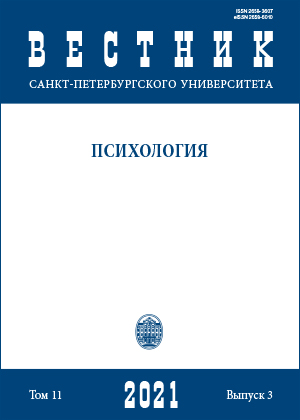Manifestation of civic position in the context of the development of ego-identity in early and late adolescence
DOI:
https://doi.org/10.21638/spbu16.2021.304Abstract
Socio-political changes in the world actualize one of the most significant social roles of every person — the citizen. Modern youth are gradually joining the socially active part of the population. This article briefly presents the view of foreign researchers on the development of citizenship from childhood. It also describes the results of the research, the aim of which is to study the characteristics of civic position in early and late adulthood. In this case, the subject’s ego-identity status is taken into account. The main research method is an ascertaining experiment using methods aimed at establishing the status of ego-identity of boys and girls. The study involved 729 people (217 boys and 512 girls) aged 14–24 years. The main hypotheses of the study were the following assumptions. As they grow older, the statuses of the general ego identity are replaced by higher ones. The level of formation of civic position is partly contained in the level of personal identity: a high level of civic position correlates to high indicators of general ego-identity. According to the results of the experiment, the hypotheses are confirmed. In addition, gender differences were found in the studied indicators. This study can serve as a basis for further exploration of the topics of civic position, social maturity and activity. In the future, it is possible to create social programs aimed at raising the level of political consciousness and involvement of young people in social activities.
Keywords:
civic position, ego identity, civic engagement, social maturity
Downloads
References
References
Downloads
Published
How to Cite
Issue
Section
License
Articles of "Vestnik of Saint Petersburg University. Psychology" are open access distributed under the terms of the License Agreement with Saint Petersburg State University, which permits to the authors unrestricted distribution and self-archiving free of charge.




